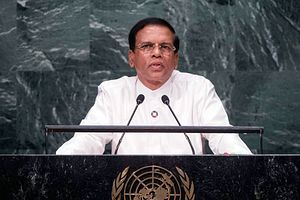Sri Lanka’s President Maithripala Sirisena has kept his country’s political rift from spilling over to a United Nations Human Rights Council meeting this week by abandoning plans to oppose the prime minister’s decision to co-sponsor a resolution giving the nation more time to address war crime allegations stemming from its civil war.
On the council’s agenda is a report by High Commissioner Michelle Bachelet criticizing Sri Lanka for failing to fulfill its pledge to investigate alleged atrocities by both the military and the Tamil Tiger rebels during the long war, which ended a decade ago. The co-resolution up for adoption on Thursday would give Sri Lanka two more years to prosecute suspects of rights violations.
Sirisena came into power in 2015 promising to help the war-torn country reconcile, including by investigating allegations of crimes under the watch of his predecessor, Mahinda Rajapaksa. But the transitional justice issue has always been controversial and unpopular with many of Sri Lanka’s majority Sinhalese population, who believe such efforts would unfairly punish “war heroes.” Faced with public resistance, Sirisena has backpedaled on his campaign promises in recent years, adopting a Sinhalese nationalist stance and declaring that he will “not allow war heroes” to be hauled before the courts.
“There is a strong feeling in the Sinhala society that the government has unduly subjugated itself to the wishes of the international community,” said Jehan Perera, a National Peace Council activist, adding that the president’s opposition “also has an electoral rationale.”
Since Rajapaksa lost his re-election bid, the strongman has built a party and has gained traction with victories in local elections. With an eye toward elections next year, Sirisena’s opposition to the United Nations resolution appears to be his latest attempt to ally himself with Rajapaksa and tap into his majority Sinhalese voter base.
Sirisena abruptly sacked Prime Minister Ranil Wickremesinghe in October last year and appointed Rajapaksa to replace him. The political crisis ended after a Supreme Court ruling reinstated Wickremesinghe, but deep tensions remain between Sri Lanka’s president and prime minister. The two leaders have functioned as rivals within one government, positioning themselves to face off in elections that must be scheduled by the end of 2019.
Sri Lanka’s 26-year civil war ended in 2009 after government troops crushed the Tamil Tiger rebels, who had fought to create an independent state for the country’s ethnic minority Tamils. According to conservative UN estimates, at least 100,000 people were killed in the war. A UN experts’ panel report later said about 45,000 ethnic Tamil civilians may have been killed in the final months of the fighting alone. What happened at the war’s bloody end remains murky because Rajapaksa’s government expelled international journalists and aid workers.
Sri Lanka promised the UN in its 2015 resolution to try alleged perpetrators in its own courts with international participation and provide information on those reported missing, compensate losses, and devolve extensive political power to majority-Tamil areas.
Bachelet’s report said that even though Sri Lanka has made some progress, it is still lagging behind.
Authorities have returned much of the military-occupied lands to civilians but have not taken steps to investigate and prosecute those accused of rights violations.
Sri Lanka set up an office on missing people, but hasn’t found anyone. A new constitution with adequate powers for the Tamil areas was identified as a key way to avoid the country returning to civil conflict. But its drafting has also been delayed.
“The political crisis at the end of 2018 further obstructed progress owing not only to the temporary paralysis of institutions but also because it generated fears that another government might not embrace the reconciliation agenda,” Bachelet said in the report, adding that stakeholders worried that Rajapaksa’s return to power threatened human rights in general in Sri Lanka.
After Sri Lanka’s foreign ministry said it would support a U.K.-led resolution giving Sri Lanka two more years to fulfill its promises, Sirisena told a local newspaper that he was considering pulling out of the UN process altogether. He later said he would send a delegation to Geneva to ask the Human Rights Council to allow Sri Lanka to deal with its problems on its own.
But finally, Sirisena agreed to send Foreign Minister Tilak Marapana, from Wickremesinghe’s party, and three of his nominees to Geneva. Marapana said the delegation would express the country’s reservations over certain sections in Bachelet’s report but would support the resolution as planned.
Sections of Tamil politicians and Tamil expatriates living in Europe and the United States, most of whom fled the country as refugees, want the UN to take immediate action on Sri Lanka and object to any more time being given. Protests have taken place in the Tamil-majority north as well as in other countries.
However, the main political party representing Tamils in Parliament says it supports the proposed resolution.
“Our position is that the international supervision should be extended and if it is not, the Sri Lankan issue will be a finished matter in the human rights council,” M.A. Sumanthiran, spokesman of the Tamil National Alliance, said in a Tamil radio interview.
By Krishan Francis for The Associated Press with additional reporting by The Diplomat.

































